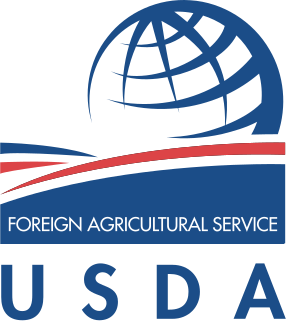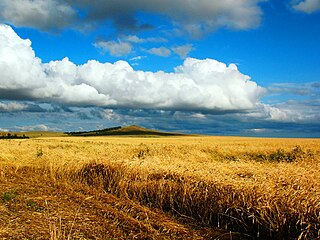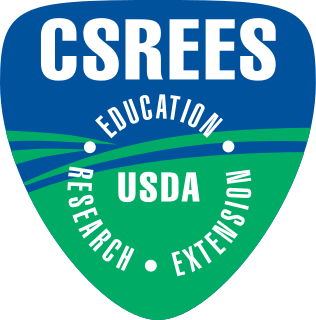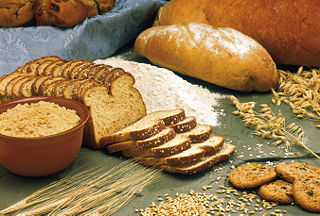
The Agricultural Research Service (ARS) is the principal in-house research agency of the United States Department of Agriculture (USDA). ARS is one of four agencies in USDA's Research, Education and Economics mission area. ARS is charged with extending the nation's scientific knowledge and solving agricultural problems through its four national program areas: nutrition, food safety and quality; animal production and protection; natural resources and sustainable agricultural systems; and crop production and protection. ARS research focuses on solving problems affecting Americans every day. The ARS Headquarters is located in the Jamie L. Whitten Building on Independence Avenue in Washington, D.C. and the headquarters staff is located at the George Washington Carver Center (GWCC) in Beltsville, Maryland. For 2018, its budget was $1.2 billion.
Natural Resources Conservation Service (NRCS), formerly known as the Soil Conservation Service (SCS), is an agency of the United States Department of Agriculture (USDA) that provides technical assistance to farmers and other private landowners and managers.

The Foreign Agricultural Service (FAS) is the foreign affairs agency with primary responsibility for the United States Department of Agriculture's (USDA) overseas programs—market development, international trade agreements and negotiations, and the collection of statistics and market information. It also administers the USDA's export credit guarantee and food aid programs and helps increase income and food availability in developing nations by mobilizing expertise for agriculturally led economic growth. In 2003, FAS began to return to a long-abandoned role in national security. The FAS mission statement reads, "Linking U.S. agriculture to the world to enhance export opportunities and global food security", and its motto is "Linking U.S. Agriculture to the World".
The Irrigation Association (IA) is a membership organization, founded in 1949, that includes over 1,500 irrigation companies and professionals in agriculture, landscape and golf.

The Conservation Reserve Program (CRP) is a cost-share and rental payment program of the United States Department of Agriculture (USDA). Under the program, the government pays farmers to take certain agriculturally used croplands out of production and convert them to vegetative cover, such as cultivated or native bunchgrasses and grasslands, wildlife and pollinators food and shelter plantings, windbreak and shade trees, filter and buffer strips, grassed waterways, and riparian buffers. The purpose of the program is to reduce land erosion, improve water quality and effect wildlife benefits.

The National Cooperative Soil Survey (NCSS) in the United States is a nationwide partnership of federal, regional, state, and local agencies and institutions. This partnership works together to cooperatively investigate, inventory, document, classify, and interpret soils and to disseminate, publish, and promote the use of information about the soils of the United States and its trust territories. The activities of the NCSS are carried out on national, regional, and state levels.

Agriculture in Kazakhstan remains a small scale sector of Kazakhstan's economy. Agriculture's contribution to the GDP is under 10% - it was recorded as 6.7%, and as occupying only 20% of labor. At the same time, more than 70% of its land is occupied in crops and animal husbandry. Compared to North America, a relatively small percentage of land is used for crops, with the percentage being higher in the north of the country. 70% of the agricultural land is permanent pastureland.

The Under Secretary of Agriculture for Farm and Foreign Agricultural Services was the third-ranking official in the United States Department of Agriculture prior to reorganization of several mission areas, announced on May 11, 2017. The mission area of USDA's purpose was to "help to keep America's farmers and ranchers in business as they face the uncertainties of weather and markets..." and that "...deliver[s] commodity, credit, conservation, disaster, and emergency assistance programs that help improve the stability and strength of the agricultural economy." The Under Secretary was traditionally appointed to serve as the President of the Commodity Credit Corporation.

The Food, Conservation, and Energy Act of 2008 was a $288 billion, five-year agricultural policy bill that was passed into law by the United States Congress on June 18, 2008. The bill was a continuation of the 2002 Farm Bill. It continues the United States' long history of agricultural subsidies as well as pursuing areas such as energy, conservation, nutrition, and rural development. Some specific initiatives in the bill include increases in Food Stamp benefits, increased support for the production of cellulosic ethanol, and money for the research of pests, diseases and other agricultural problems.
The Conservation Security Program (CSP) was a voluntary conservation program in the United States that supported stewardship of private agricultural lands by providing payments and technical assistance for maintaining and enhancing natural resources. The program promoted the conservation and improvement of soil, water, air, energy, plant and animal life, and other conservation purposes. Congress established the CSP under the Farm Security and Rural Investment Act of 2002 (FSRIA), which amended the Food Security Act of 1985. The program was administered by the Natural Resources Conservation Service (NRCS), an agency of the United States Department of Agriculture (USDA).

The Federal Crop Insurance Reform and Department of Agriculture Reorganization Act of 1994, Pub.L. 103–354, 108 Stat. 3178, was introduced on April 14, 1994 by Eligio de la Garza (D-TX) and was signed into law on October 13, 1994 by President William J. Clinton. It consisted of two titles:
The Market Access Program is administered by the Foreign Agricultural Service and uses funds from the Commodity Credit Corporation (CCC). It helps producers, exporters, private companies, and other trade organizations finance promotional activities for agricultural products of the United States. MAP is designed to encourage development, maintenance, and expansion of commercial agricultural export markets. As such, it is considered to be a World Trade Organization "Green Box" program. Activities financed include consumer promotions, market research, technical assistance, and trade servicing.

A Limited Resource Farmer or Rancher is one of a larger group of “targeted farmers" that also includes beginning farmers and ranchers and socially disadvantaged farmers and ranchers. Limited Resource Farmers are characterized by having limited farm sales and income. The USDA created the Limited Resource Farmer and Rancher program to ensure that these farmers and ranchers can develop economically viable farms, have access to USDA support, and ensure that programs are in alignment with farmer and rancher needs and concerns.
The 2002 farm bill, authorizes enrollment of 2 million acres (8,100 km2) of restored or improved grassland, range land and pastureland under temporary and permanent easements, or contracts of at least 10 years. Under the Grasslands Reserve Program (GRP), enrolled land must be in parcels that exceed 40 acres (160,000 m2). Technical assistance is provided to restore grasslands. A total of $254 million in mandatory funding from the Commodity Credit Corporation (CCC) between FY2003 and FY2007 is provided. It also provides cost sharing payments at 75% to restore disturbed grasslands and 90% to protect virgin grasslands.
An agricultural attaché is a diplomat who collects, analyzes, and acts on information on agriculture, agribusiness, food, and other related spheres in a foreign country or countries. Agricultural attachés may be directly employed by the sending country's agriculture ministry, or they may be employed by the foreign ministry. Typical activities of an agricultural attaché include reporting on crop conditions, food availability, domestic agricultural policy and the foreign trade outlook in agricultural commodities; negotiating food aid agreements and agricultural credit lines; implementing agricultural technical assistance programs; facilitating professional contacts, exchanges, and technology transfer; assisting in negotiating bilateral and multilateral trade agreements; and promoting the exports of agricultural and food products. In many cases, agricultural attachés may also bear responsibility for issues related to the environment, food security, food safety, fisheries, forestry, and indeed anything related to rural areas and the rural economy.
The New York City Coalition Against Hunger (NYCCAH) is a nonprofit organization, which aims to “enact innovative solutions to help society move ‘beyond the soup kitchen’ to ensure economic and food self-sufficiency for all Americans”. NYCCAH works collaboratively with local, state, and national legislatures as well as New York residents and community associations. In contrast to other organizations, NYCCAH generally does not distribute food but rather concerns itself with providing technical assistance to groups which do while simultaneously affecting hunger policy at a more macro-urban scale.

The Cooperative State Research, Education, and Extension Service (CSREES) is an extension agency within the U.S. Department of Agriculture (USDA), part of the executive branch of the federal government. The 1994 Department Reorganization Act, passed by Congress, created CSREES by combining the former Cooperative State Research Service and the Extension Service into a single agency.

The Agriculture, Rural Development, Food and Drug Administration, and Related Agencies Appropriations Act, 2015 is an appropriations bill for fiscal year 2015 that would provide funding for the United States Department of Agriculture and related agencies. The bill would appropriate $20.9 billion.

Food Export Association of the Midwest USA is a non-profit organization that promotes the export of food and agricultural products from the Midwestern region of the United States. The organization has been helping U.S. suppliers of Midwestern food and agricultural products sell overseas since 1969.











